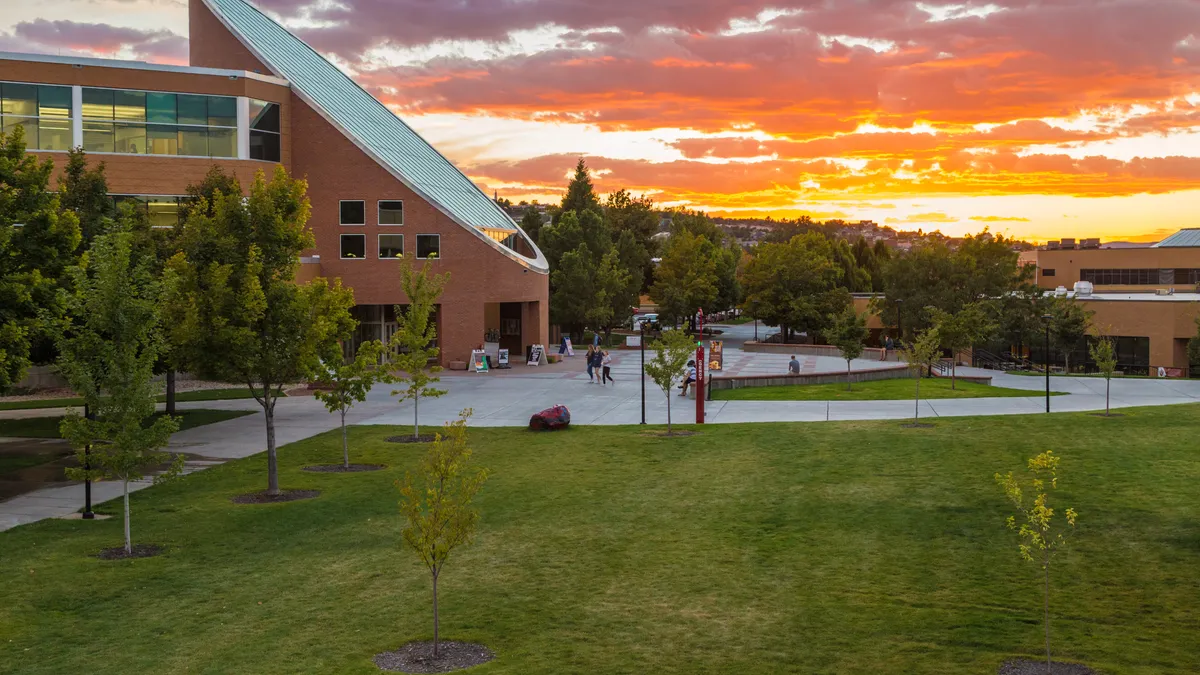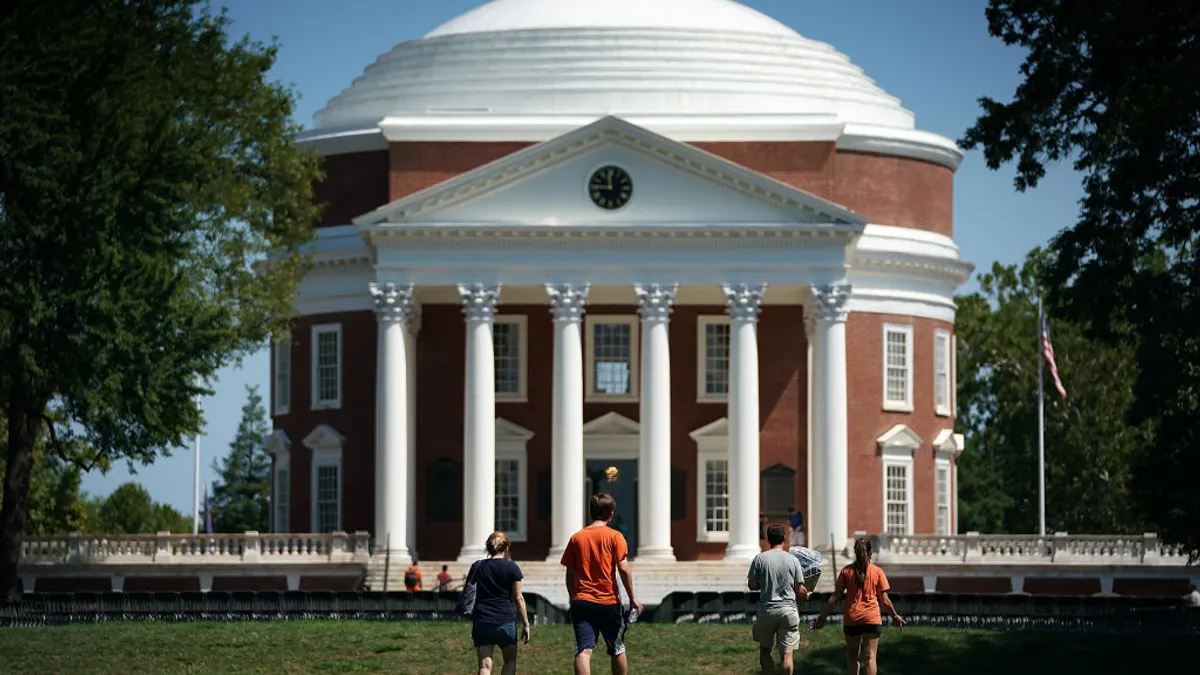When Kathryn Bjorling returned from her 18-month mission trip to Peru for The Church of Jesus Christ of Latter-day Saints, she knew she wanted to top off her associate degree in business with a four-year diploma. But she didn't want to take out a loan to do so.
"All of my friends were going to school for $40,000, $60,000, $80,000 a year at these private schools and just going into so much debt," she said.
Bjorling, 22, works within the business development department at a tech company, and intended to work for a full year to save up for college. But a new program at Southern Utah University, where she earned her first degree, changed her plans.
The regional public university recently announced it was launching an online bachelor's degree in general studies that costs $9,000. Southern Utah piloted the program last fall with 111 students, including Bjorling, before officially rolling it out this spring.
Southern Utah emailed 14,000 former students who hadn't completed a bachelor's degree to inform them of the pilot. "When this opportunity presented itself, it made a lot of sense for me because I can afford it based off the income I'm making," Bjorling said. "I don't have to go into debt for any reason, and for me, being debt-free is everything."
Scott Wyatt, the university's president, said one of the program's main goals is to serve the roughly 36 million people in the U.S. who start college but don't finish.
The university is able to offer the online bachelor's degree at one of the lowest prices nationwide partly because officials don't view the program as an opportunity to make a profit but rather enable social mobility. That diverges from the way colleges usually approach online education, Wyatt argued, as many view virtual offerings as a revenue-generating opportunity.
It's one of several colleges that have put more emphasis on lowering the cost of online education. Officials at some of these schools say the coronavirus pandemic and the resulting economic downturn are accelerating their efforts.
"We want to match our costs with student tuition as closely as we possibly can because we only have one purpose, and that is to open the doors to people who otherwise couldn't get a higher education," Wyatt said.
However, these types of initiatives are tricky, as colleges must balance affordability with quality, higher ed experts warn. Schools hoping to adopt a similar approach may encounter struggles, including the upfront investment of producing online courses and the need to make up for revenue declines brought on by middling public support or enrollment.
Creating a $9,000 degree
Other colleges have made waves by rolling out extremely low-priced degrees. Georgia Tech, for instance, partnered with Udacity and AT&T in 2014 to offer an online master's of computer science for under $7,000. Since then, other MOOC providers have teamed up with universities to help them offer graduate degrees for a similar price point.
But low-cost, online undergraduate degrees have remained elusive. Southern New Hampshire University, which has one of the largest online enrollments in the U.S., charges its online undergraduates $320 per credit, while Georgia's Valdosta State University recently announced several online undergraduate degrees for $299 per credit.
At those rates, the 120 credits usually needed to earn a bachelor's degree would cost close to $40,000.
"We want to match our costs with student tuition as closely as we possibly can because we only have one purpose, and that is to open the doors to people who otherwise couldn't get a higher education."

Scott Wyatt
President, Southern Utah University
Southern Utah brought the degree price down to $9,000 in several ways. For one, the program offers a limited number of courses — unlike a typical undergraduate degree that gives students many classes to choose from. They each last seven weeks.
That lowers the curricular development and teaching costs for the university, while creating a more streamlined pathway for learners, according to Southern Utah.
"It actually makes it easier for the students because the students that we're building this for really want to move through," Wyatt said. "They're not interested in taking a bowling class, or a golfing class or a Russian literature class."
The university is also keeping costs down by having faculty members teach the classes comprising the program through course overloads, which are additional classes that instructors can sign up to run on top of their usual teaching load. They pay about $3,000 each, Wyatt said, making such classes far less expensive for the university.
"That's the key to this working," Wyatt said. However, this method also limits the number of students the program can handle. "If we had 20,000 or 30,000 students, I'm not sure how we would do it," he added.
Will it catch on?
Wyatt said Southern Utah is aiming to enroll several thousand students in the program, which is open to students from other states and countries. He is also hoping Southern Utah's example will spark other colleges to similarly bring low-cost, online degrees to market.
"We're hoping that we can be a little disruptive and motivate everybody else to join us," he said.
Higher ed experts expressed doubt, however, that other institutions would copy Southern Utah's model. For one, many public colleges and universities view online education as a money-making opportunity.
"The institution ultimately wants to diversify its revenue (and) doesn't want to be overly dependent on local and state governments," said Richard Garrett, chief research officer at Eduventures, a higher ed research and advisory firm. But volume is generally necessary to create the economies of scale needed to offer a low price.
Garrett said colleges have shied away from offering low-priced, online undergraduate degrees because they serve a population that usually requires more student services than graduate students, which have generally been the targets of such efforts. "I think the difference with Georgia Tech is that it is a master's degree," he said. "You can assume a certain academic maturity, experience in higher ed and past success."
Higher ed experts also raised concerns about the degree being offered in general studies rather than a more narrow subject. Brendan Cantwell, a higher ed professor at Michigan State University, noted that recent policy discussions have focused heavily on education for specific skills. "General education is like the antithesis of that," he said.
He and others say it's an open question whether students will find the option attractive. However, Bjorling described the general studies aspect as a draw and views it as a stepping stone to potentially getting a master's in business administration.
"I just know that getting the degree is important," Bjorling said. "It was the easiest and most logical way for me to get it in a timely manner."




















